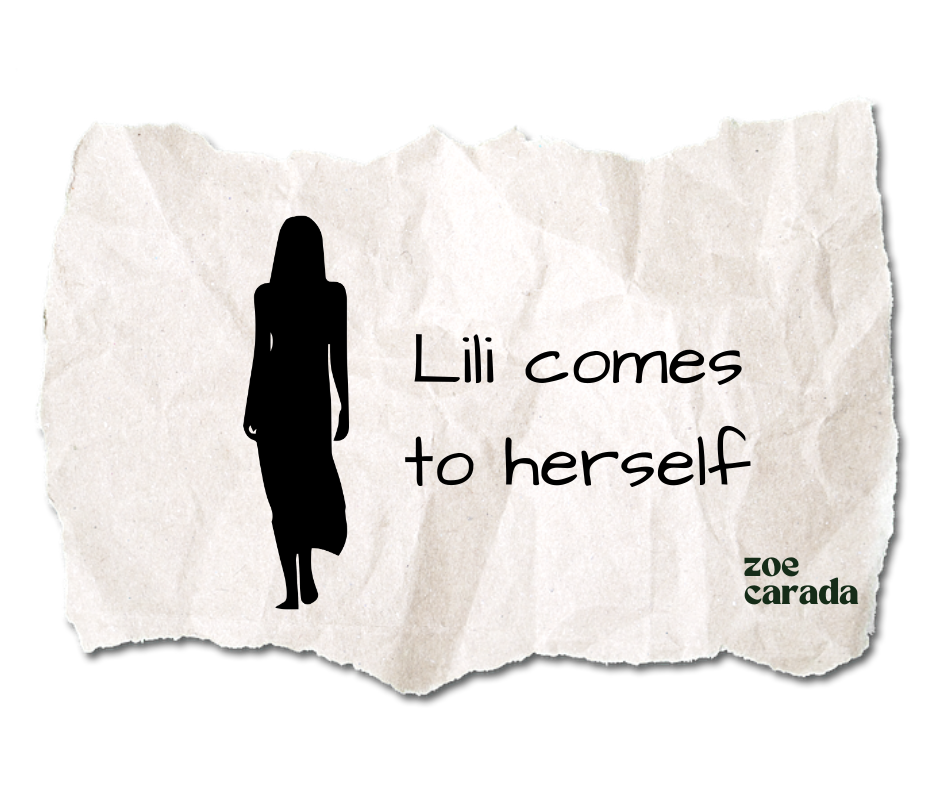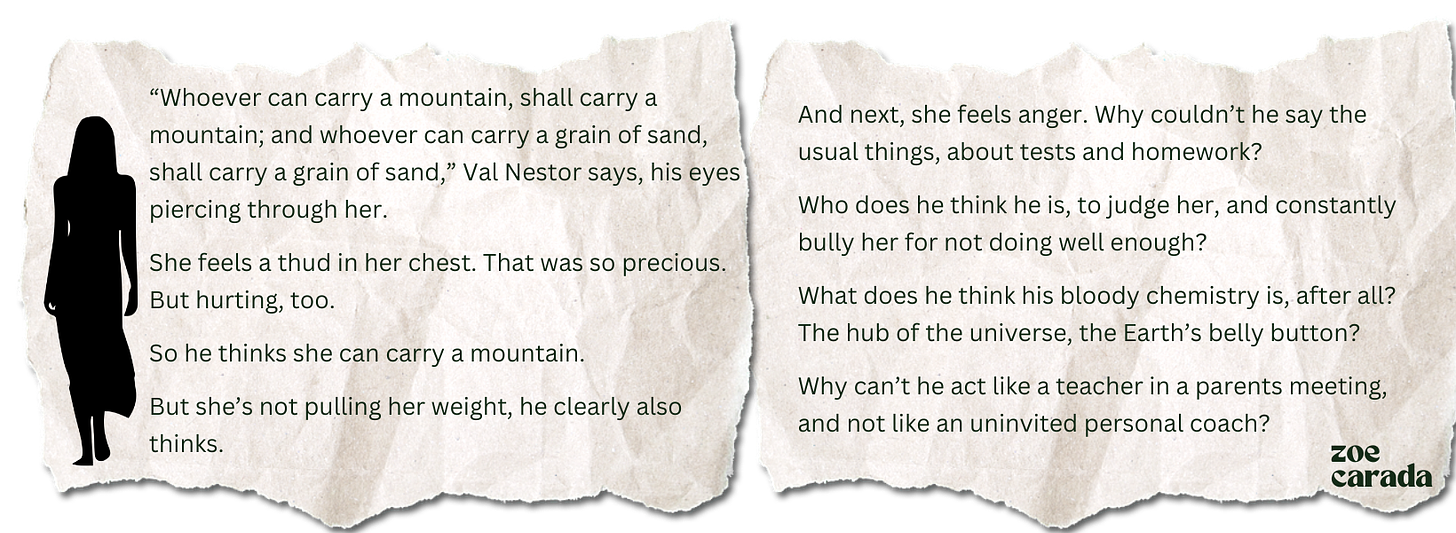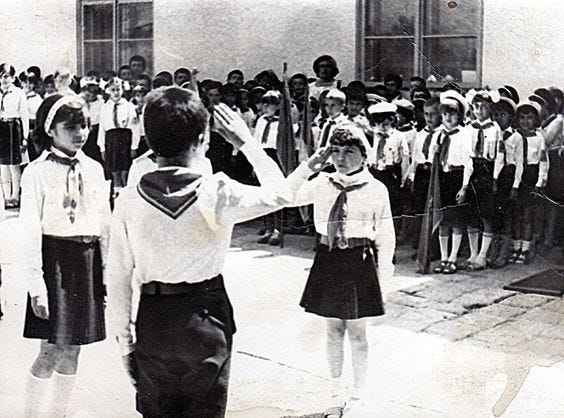I am publishing here extracts of my novel-to-be. Some of them are chapters that will not be part of the final book, but I still think you might enjoy them.
In the Mentatrix world, writing is a springboard for self-reflection. With each extract from Lili Comes to Herself, I’m inviting you to think about the character(s)’ dilemmas and choices, and possibly relate them to yourself.
Lili is a final year high-school student in communist Romania of the 1980s, counting the days until school is over. Going to university is the start of real life, when the young people gain an identity. The question is: what identity?
Here’s part of a conversation with Val Nestor, a mentor teacher. Why is she there? What is the dilemma that she’s trying to address? Can you relate to her in some way?
“How’s your love life?” Val Nestor puts an arm around her shoulders, head bent, as if to listen to her earnestly, although his tone is half playful. She’s been waiting for him to come out of the staff room, wanting to talk, and he’s walking her along the school corridor to the science lab, where they can sit undisturbed.
Lili sighs, half exasperated, half amused. She’s going to miss this theatrical, obnoxious, impertinent, bully-ish, and yet and yet so lovable teacher.
“Love life? What’s that?” she mocks confusion.
Nestor lets out the gurgling laugh he’s been holding back while acting as an earnest teacher.
“A girl like you, what a shame,” he teases her. “But I guess it’s fine as it is. It’s only six months to go,” he says, suddenly game aside, and he raises his dark, bushy eyebrows.
She takes the familiar seat in a pupil’s desk, and he grabs the teacher’s chair and sits down opposite her. Then, he remembers something; he stands up, walks over to the corner behind the teacher’s desk, and switches on the radio. He looks at her with a complicit smile. Better to keep the conversation for themselves.
My home is a song with graceful tones, holding me gentle, holding my life. The lady of Romanian pop music. What does her flat look like, Lili wonders each time she hears the hit. Surely it’s not cold and draughty, with sooty ceiling corners.
“Come, it’s been a while, what’s up in your life?”
Lili browses quickly through her routine, but can’t find anything worth proclaiming as news.
“Well,” she sighs again, “nothing’s up. That’s the point, I guess.”
Nestor keeps quiet, waiting for more. His piercing gaze, this alone was worth coming to talk to him. It’s sharp and alive, unlike her daily life, which feels blunt and blurry.
“I’d imagine a lot of studying’s up,” he offers, “or I should hope so, at least!”
She rolls her eyes; there it goes again, his old obsession that she’s not working hard enough.
“Oh, please, I thought we were past that!”
“Past what? Past the fact that you’re still not shining as you should, because you spend your days daydreaming?” he machine-guns her, retaining half of his playful smile. It’s the point where Lili can’t tell if he’s still only teasing, or if he means harm. How did he know whether she shone at all, now he was no longer their teacher? And he knew damn well she’d given up cramming for chemistry, did he question other teachers about her in the staff room?
“You still think I daydream? When, could you please tell me, when could I do that? I’d love to have half an hour to just daydream, or worse, just to stare into blankness, but no, I’ve got the next private lesson to hike to, ninety minutes on the tram to, and ninety minutes back, not to count the class itself! I can’t believe you still bear me a grudge for not shining as you think I should! After all these years! When all I want is to feel there’s some room for me in this routine, too, not just drill, drill, drill.”
She stops short, almost bursting into tears. But that’s also part of why she’s here. He does that to her, and it does her good. To feel alive, even if it hurts.
My home is the best that I have, and I’m the heart beating within its walls.
“Remember that—” that rubbish he told her “—remember what you told me in September, at your farewell parents meeting, in front of the whole crowd, that I wasn’t carrying my mountain?”
He grins. It was the meeting he’d been invited to give his feedback to each student, because another chemistry teacher was taking over.
“I didn’t say you weren’t carrying your mountain. Maybe you weren’t carrying your grain of sand, if that’s what you’re only capable of,” he says, mock shrugging.
She slaps her thighs in frustration with a scoff.
“Why, I thought that was a good one,” he goes on. “Deep. Just like the fancy readings you enjoy,” he teases her.
Lili frowns, briefly intrigued.
News bulletin. The country’s president, comrade nicolae ceausescu, has undertaken a work visit at the steel plant in galati. He was welcomed by the crowds of workers with —“
“Is Raskolnikov still your favourite hero? Surpassing even Winnetou?” He grins again, revealing his crooked teeth.
She blushes. So he remembers that, too.
“Winnetou was when I was thirteen. Now, it’s Lennon.”
Nestor whistles in appreciation.
“So now we’re finally getting closer to real heroes. That’s progress. Knowing you, I’d say you like Imagine,” he struggles to hold back another laugh.
She knows better than get carried away with vexation. This is Val Nestor, her former chemistry teacher, and she expects he’ll never change, even when he retires, many decades from now.
—the quarterly targets have been achieved ahead of term, in alignment with the five-year development plan—
“No, you see, you don’t read me like you think you do,” she takes her turn teasing him. “It’s Lennon’s mastermind, and clever, killing irony, and for all that, he’s a man in love, who’s capable of love—“ she lets her short rant trail off. He’ll tease her for being sentimental next thing she knows.
“Wasn’t Raskolnikov the same?” he questions her instead.
“Raskolnikov was—he was the inverted hero. The one nobody suspected, while he was being chased for murder. Look, let’s forget about heroes, at least today,” she pleads.
“Heroes are great, they inspire us,” Nestor probes.
Lili swivels her head to look out the window. The dead, frozen January.
Comrade ceausescu congratulated the workers and gave guidance on the way forward —
She wanted no hero status. They had been expected to impersonate heroes from pre-school age: a motherland scout with four, a pioneer with seven, a YC — young communist with fifteen. Always part of a patriot squad, divided by commander titles, endowed with ceremonies, salutes, and red hard-cover codes.
As far as she could remember, school had made her feel out of place, out of character, and awkward: dressed in school uniforms that were either the wrong size or the wrong state of wear, singing the stiff verses of devotion to an abstraction she was too young to grasp: a motherland, a multilaterally developed society, a New Citizen, and a bright future.
It had nothing to do with herself.
Her school performance had been too good for her to have reason to feel like a misfit, but the hero persona didn’t fit her either. Unlike her one-for-all-all-for-one fantasies, being a hero was a single-minded, one-way business: one for the Party, all for the Party. The Party above all.
(to be continued)
Is Lili making a mistake, you think? Is she mixing something up? Are there any risks she might be getting into bigger confusion still? Would you have anything to say to her, if you were in Val Nestor’s place?
Can you relate to what she feels, and going through? Is she reminding you of an experience, or time of your life, that was in any way similar?
If yes, what helped you? A mentor? A word dropped casually, but which brought a click? A rule or principle you had set up for yourself from past experience?










I think as a writer you are finding your voice as you share this story. I wonder if Nestor has some redeeming qualities because he doesn't seem like a likable teacher. Asa reader, I can feel Lili's pain.
Nestor is not supposed to be an easy coach; but he cares, and has a flame. He asks uncomfortable questions. Thanks feedback, Jill, good to know!